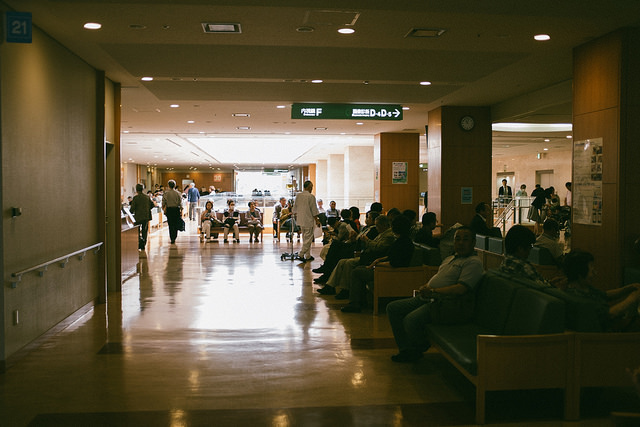
What to Do When You Get Sick or Injured in Japan
What to do when you get sick or injured in Japan? Getting the help and health care you need can be quite the ordeal in a country with a different language and culture but here's a guide with everything you need to know when getting injured or sick in Japan.
This post may contain affiliate links. If you buy through them, we may earn a commission at no additional cost to you.
You're on your trip to Japan, you don't know what bad luck you've picked up, but you've somehow broken your leg. You definitely need medical attention, but you can't speak any Japanese. What should you do? Read this guide and don't panic!
1. Call 119 if you need immediate medical attention
You can call 119, which is a hotline for the ambulance service which will take you straight to the nearest hospital. The operator will ask you where you are, and what the situation is in Japanese.
2. Call the hotlines and websites listed below for information.
aquaring w/FlickrThese hotlines and websites will offer you assistance in English, and let you know whether you need to go to the ER or to the nearest hospital by yourself.
The AMDA International Medical Information Center provides information for medical care and hospitals that offer English speaking staff.
Phone: 03-5285-8088 Hours: 9:00-17:00, Mon-Fri
Himawari is a search engine for hospitals and clinics in Tokyo. You can also call to search hospitals and clinics that offer English speaking staff.
Phone: 0570-000-911 Hours: 24 hours, Daily
Japan Helpline is a non-profit organization that offers 24 hours medical assistance for foreign residents in Japan nationwide, from simple questions to emergencies.
Phone: 03-5774-0992 Hours: 9:00-23:00, Daily
Tokyo English Life Life (TELL) offers anonymous telephone counseling in English.
Phone: 03-5774-0992 Hours: 9:00-23:00, Daily
International Mental Health Professionals Japan offers service to find qualified psychotherapists and counselors serving the international community in Japan. Services are offered in multiple languages.
Our Top Tips
JR Pass for Whole Japan
Explore Japan in the most convenient and economical way with a Japan Rail Pass! It is valid for the majority of railways and local buses operated by JR.
3. How do you go to a hospital?
Christian c/FlickrUnless you've ridden in an ambulance, on your first visit, you'll probably end up in a clinic or a small hospital. At the clinic or small hospital in town, you will be asked you for your insurance card and to fill in a form about your basic medical information. Unless you have a very serious condition, medical attention from these clinics or small hospitals should do just fine. Here's a list of English speaking doctors in Tokyo.
4. I think I have a very serious condition.
5. Your doctor has done your treatment. What happens now?
You'll need to pay. Now, Japan has two type of health insurance; Employee Health Insurance and National Health Insurance. If you are a resident in Japan and work for a company that covers insurance, you will have Employee Health Insurance. If you're a resident in Japan who is not employed or a student, register up for the National Health Insurance. You must have a visa that is valid for over a year. These insurance will offer coverage depending on your income. There's also private insurance that cover treatment plans the two above doesn't, such as cancer treatment. Some hospitals don't accept foreign insurances, so be sure to check with the hospital's policies first. If you don't have any kind of insurance, sorry, but you'll have to cover 100% of the medical bills.
Our Top Tips
Japan Shinkansen, Narita Express (N'EX) & Express Train Tickets
Plan ahead by booking your shinkansen, airport train, and express train tickets online in English. Have the tickets sent to you by mail or collect them at the station once you're in Japan.
6. Where do I get my medicine?
When you're done with your payment, you will receive your prescription on a piece of paper called a Shohou-sen (処方箋). You should hand this in to a pharmacy, called Chouzai Yakkyoku (調剤薬局), where you will receive your medication . If it's your first visit, they'll ask you to fill in a basic medical information form. They will also hand you a Okusuri Techou (お薬手帳) which is a notebook to inform psychiatrists and pharmacists what medicine you're taking. Don't forget to show your insurance card here, too. If you're having another visit to the pharmacy, don't forget your Okusuri Techou.
7. Seasonal sickness in Japan you should look out for.
Food poising is common during the Tsuyu (梅雨) season, which is around July. During Tsuyu, rain continually falls throughout the day, which leads to extreme humidity, which in turn makes food go bad quickly. This leads to food poisoning, so be sure to finish your food quickly and to not leave your cooked food on the counter for a long period of time.
Hay fever, called Kafunshou (花粉症) in Japanese, is common in April and May. There's counter medicine you can buy at the pharmacy, but if you want something more effective, go consult a doctor.
Influenza starts going around in the cold season, starting from November. People use flu shots to prevent this from happening, but sometimes it doesn't work. Avoid large hospitals if you get the flu, because it's highly likely a lot of sick people will be around and you'll catch something else too.
The information in this article is accurate at the time of publication.




